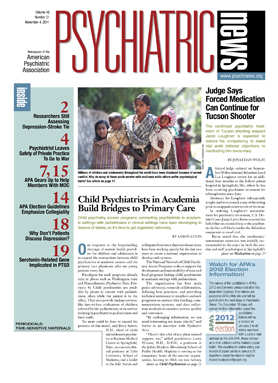A federal judge ordered on September 28 that criminal defendant Jared Lee Loughner return for an additional four months to the federal prison hospital in Springfield, Mo., where he has been receiving psychiatric treatment for schizophrenia since June.
Attorneys for Loughner subsequently sought, and were denied, a stay of the ruling prior to an appeals court review of the issue.
In ordering Loughner's recommitment for psychiatric treatment, U.S. District Court Judge Larry Burns asserted his belief that an extended stay at the psychiatric facility will likely render the defendant competent to stand trial.
Burns noted that the involuntary-commitment extension was initially recommended to the court by both the warden and staff psychologist at Springfield's Medical Center for Federal Prisoners. Burns rejected the defense's argument that such recommendations are insufficient for determining whether Loughner should remain at the hospital, and he also denied a defense motion to temporarily halt the involuntary medication of Loughner.
In August, APA and the American Academy of Psychiatry and the Law (AAPL) submitted an amicus curiae brief to the U.S. Court of Appeals for the 9th Circuit on the issue of involuntarily medicating a violent pre-trial detainee (Psychiatric News, September 2).
"Both organizations seek to ensure that the Court has well-grounded facts about antipsychotic medications and appreciates the adverse consequences—for the patient, for other patients at an institution, for the legal system's interest—of not giving medications that are medically appropriate treatment for psychotic illnesses," wrote APA and AAPL in the brief.
Burns also denied the defense's post-ruling motion for a stay of his recommitment order, maintaining that the line of reasoning behind the motion emphasized "semantics over substance." The defense had argued that restoring Loughner's competency is different from ensuring that his "capacity to permit the proceedings to go forward" is unaffected by any potential side effects of medication.
Attorneys for Loughner also accused the court of failing to outline a specific treatment plan for restoring the defendant's competency, as well as failing to establish "substantial probability" that Loughner's competency can be restored within the four additional months ordered by the court.
"There is overwhelming evidence that the defendant is getting better, not the least of which is the noticeable improvement in his appearance, demeanor, and behavior since he was last in court," wrote Burns in his ruling denying the defense's motion for a stay.
Loughner's attorneys reiterated their objections to the district court's ruling in a second motion to stay Burns's recommitment order filed with the 9th Circuit Court.
In response to that motion, Acting U.S. Attorney Ann Birmingham Scheel and Assistant U.S. Attorney Christina Cabanillas argued that it lacked merit since it failed to show "the likelihood of irreparable injury" if Loughner is returned to the federal hospital.
"The defendant's continued progress towards competency restoration at [the federal medical center] should not be disrupted to have him remain in a … maximum security prison while his appeal is resolved, particularly where his appeal is not likely to succeed," wrote Scheel and Cabanillas.
The 9th Circuit agreed with the U.S. attorneys and ordered that the defendant "be involuntarily medicated for the immediate future whether or not he is transported to the Missouri facility." With the defense request for a stay rejected, the appeals court said that it would begin hearing oral arguments on the appeal of the district court ruling extending Loughner's involuntary treatment on November 1.

